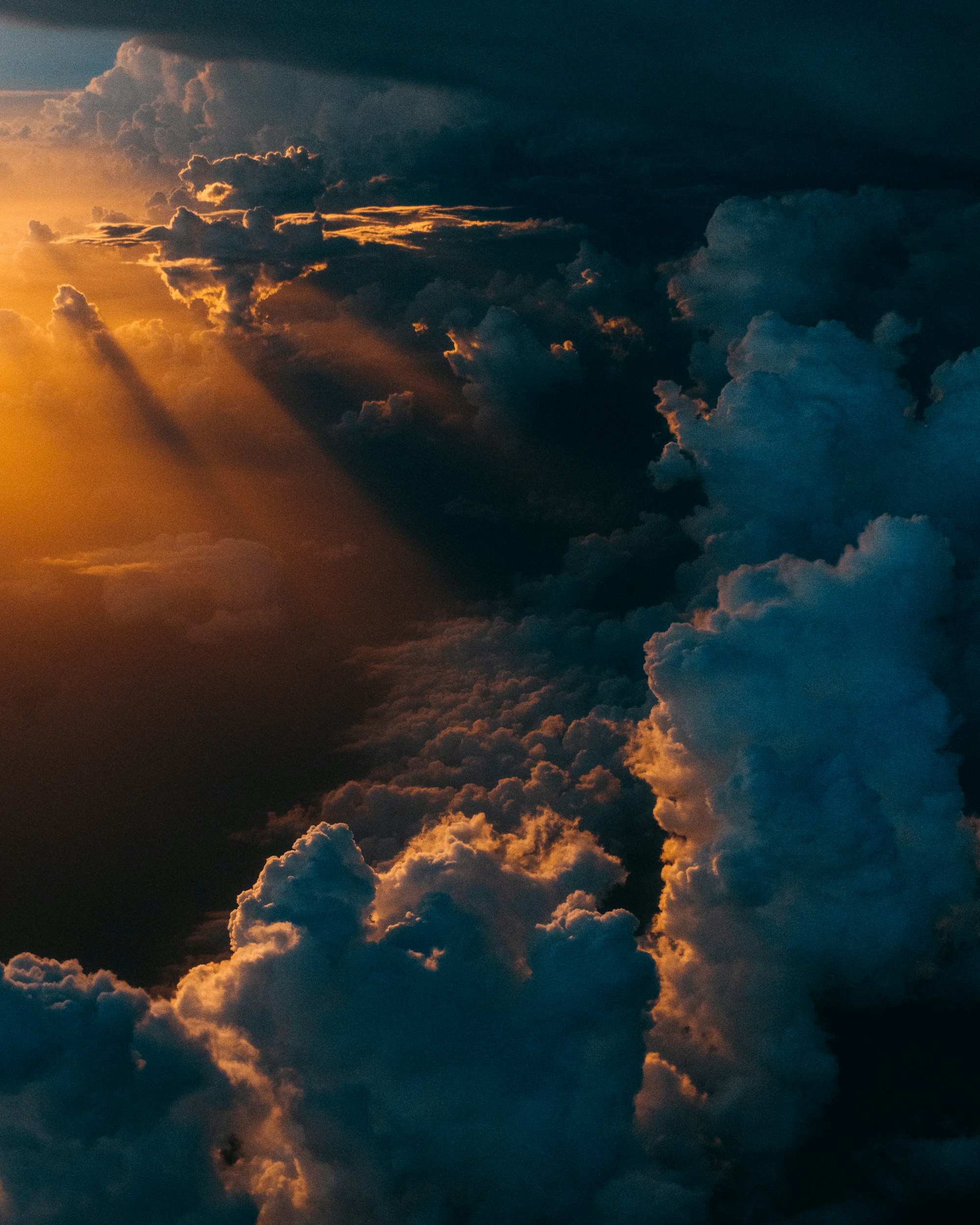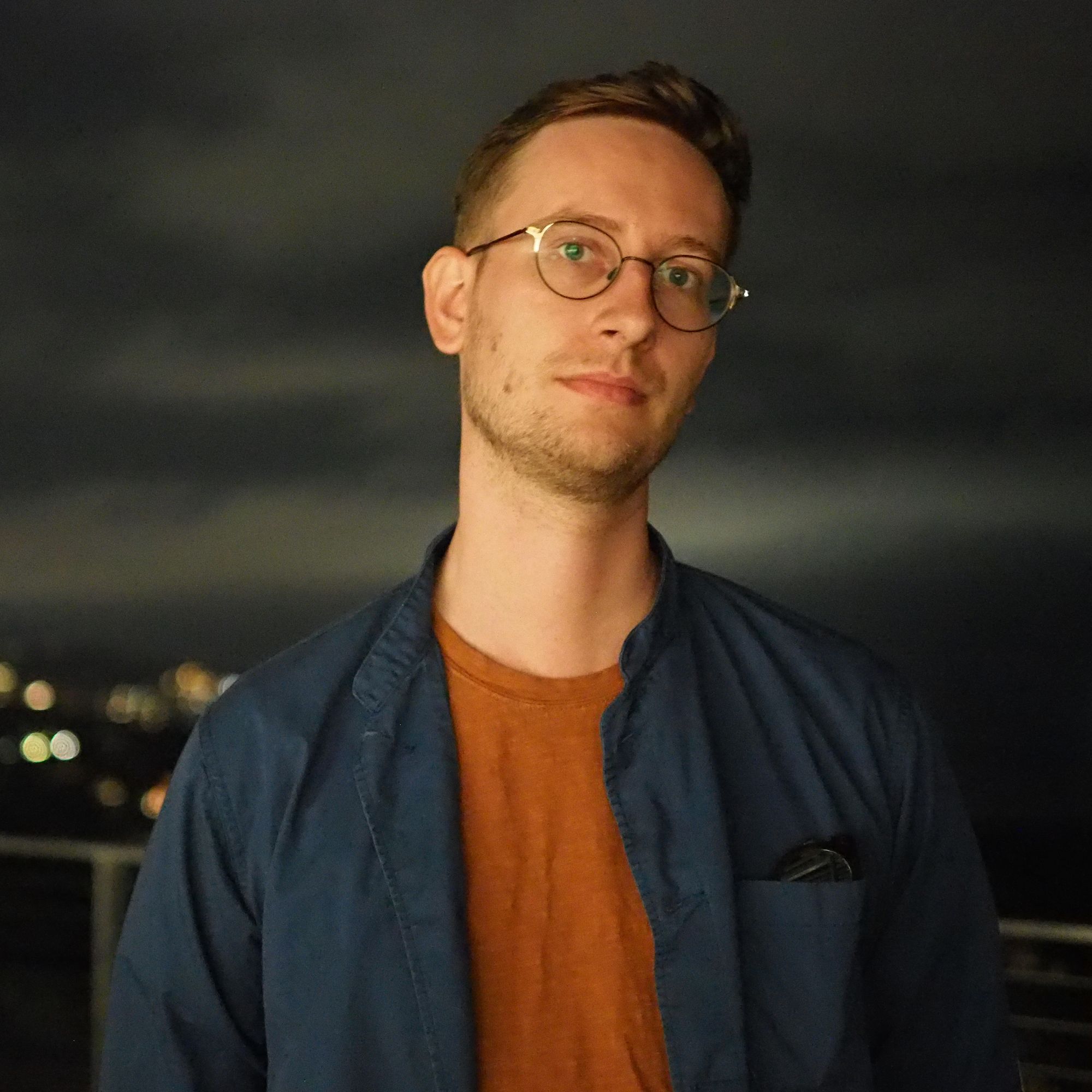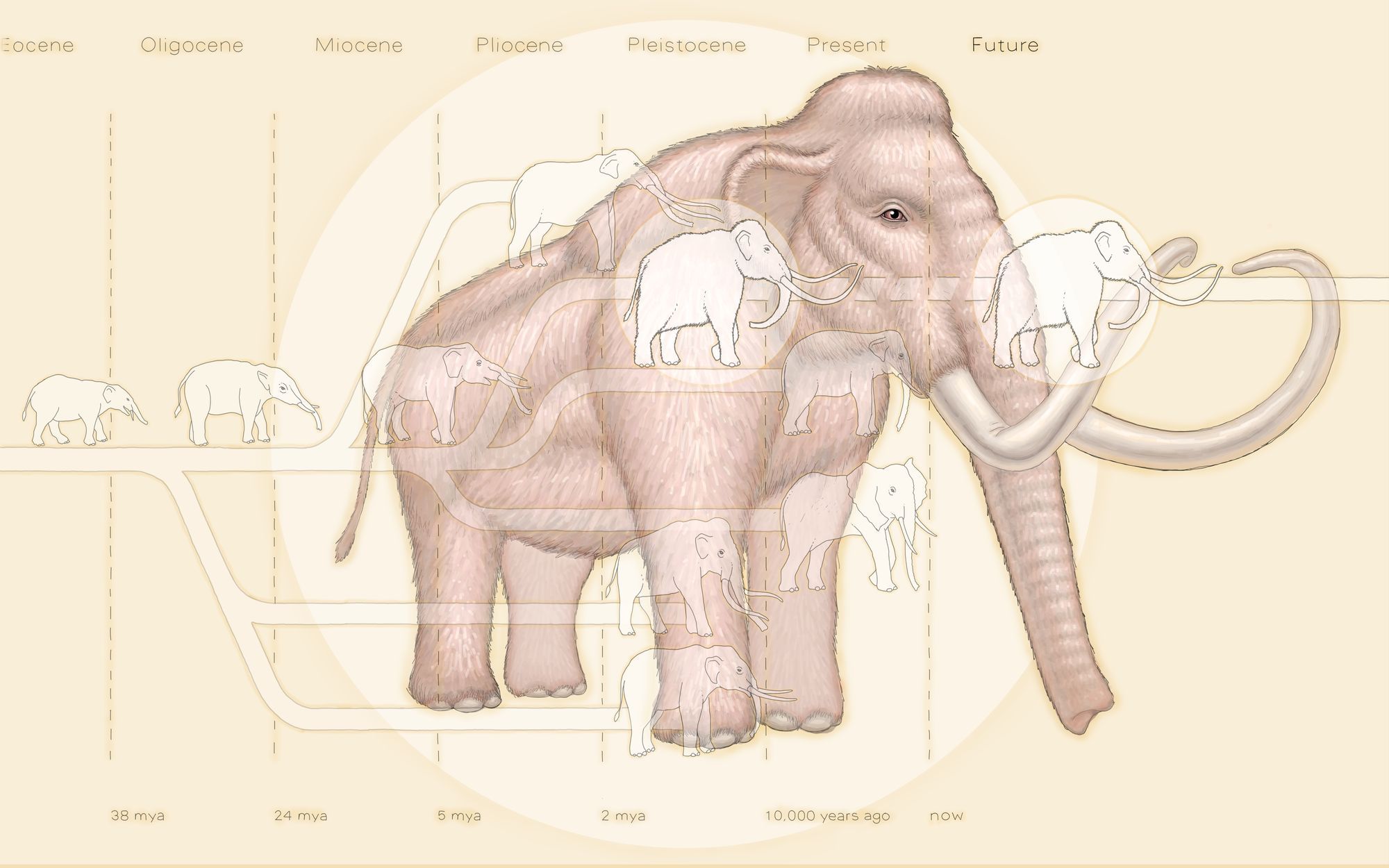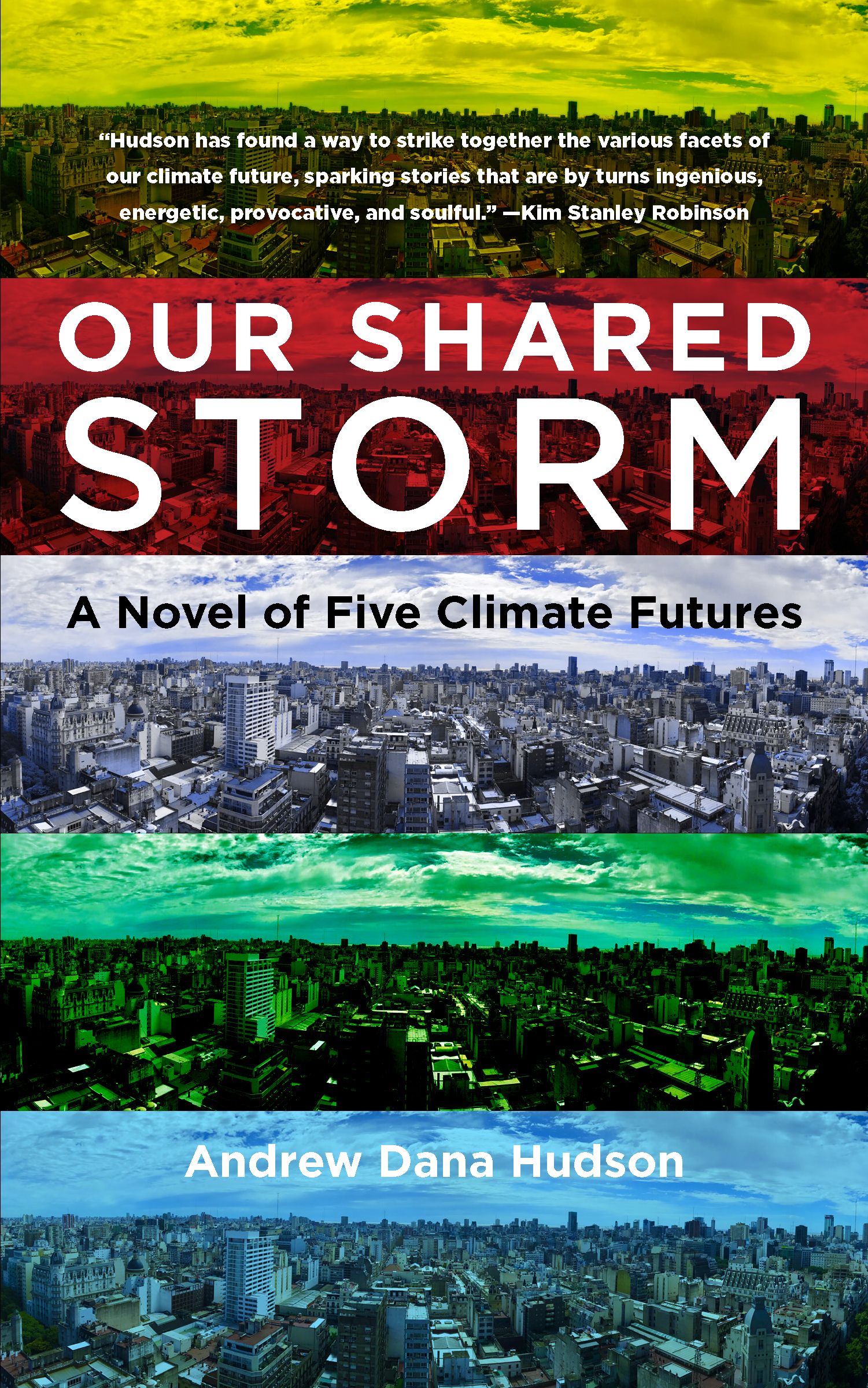
Envisioning Our Shared Storm
We talk to the futurist, speculative fiction writer, and Long Now Member about scenario planning through fiction.
The future is inherently a space of imagination. To think responsibly and comprehensively about what it may hold, any good forecaster needs to think beyond precise extrapolations and wander responsibly into the world of speculation.
Futurist, science fiction author, and Long Now member Andrew Dana Hudson’s work helps guide us into that world of speculation. Hudson’s work spans both fiction and nonfiction. As a fiction writer, he’s been published in Slate Future Tense, Lightspeed Magazine, Vice Terraform, MIT Technology Review, Grist, and Long Now Ideas. As a nonfiction writer, he’s been published in Jacobin, Slate, and Solarpunk Magazine. In this interview, Andrew discusses his new book, Our Shared Storm: A Novel of Five Climate Futures, as well as his approach to thinking about the long-term future, the solarpunk movement, and the notion of “Climate Repair.”

This interview has been lightly edited for length and clarity.
You've got experience in writing about the future from a few different angles. You write various sorts of speculative fiction, but you also write a lot of non-fiction, as a cultural critic and researcher into similar topics. How do you see these different paths working together? What different insights do you get from these different angles?
In some ways I don't think of myself as a non-fiction writer, but there's a lot of non-fiction pieces on my website that I've written over the years. In many ways, the nonfiction pieces are more fleeting. You sort of write them for a moment and put your argument into the discourse and then things move on. With stories, I return to them more frequently for some aesthetic element or idea.
Non-fiction is where I make arguments, but I pretty much know what I want to say. Fiction is where I try to articulate something that isn't yet an argument, to unveil something so that it's there and then you can make an argument about it. It’s saying “imagine this other situation” and then figuring out what the conflict or the debate that world is having. Hopefully, engaging with that tells you something about our present situation.
Some of your nonfiction writing, in your newsletter and elsewhere, is nonfiction about fiction. For example, you recently wrote a piece about the different aesthetic ideas that people often associate with the future in science fiction – the common use of pods and wrist computers, say.
There are very few fiction writers who are just writing from pure instinct, right? Almost everyone is in this sort of big cocktail conversation and people are making different points. With speculative fiction, there are all these ways people have imagined the future; so many different ways that anytime you write, you’re speaking to this past stack of possibilities. It’s like a big Jenga tower and you’re plucking something out and saying, “Oh, maybe it doesn't go this way. Maybe it goes like this,” and you put it back on top of the stack.
So it's a conversation that we're all in. I hope that pods piece did not come off subtweeting specific people, even though it was inspired by specific stories that I had read and thought, “Oh, I hate it when people do this.” Don't tell him I said this, but the guy who I think gets me most annoyed about wrist computers is Kim Stanley Robinson, because he insists on including them even in his most realistic pieces. They're just phones. They can hold them in their hands!
On the topic of the Jenga tower of influence: Who do you feel you are in conversation with most?
I’m definitely building off of some of the cyber punks: William Gibson, Bruce Sterling, Neal Stephenson. Increasingly, my work is responding to other people in the solarpunk space. Becky Chambers’ solarpunk novellas have really seeped in my thinking. Malka Older is someone whose work I really appreciate. Obviously, Kim Stanley Robinson is someone who's engaged with a lot of ideas that I found really interesting. We both had climate bureaucrat books come out within a year or two of each other. There's a lot of people in this space trying to ask interesting questions about climate.
[Ursula K.] Le Guin is another author [that I’m influenced by.] I mean she's the G.O.A.T — the greatest of all time. Anything one writes about social change and how our social arrangements are constructed — anything utopian — probably nods to Le Guin.

In that discussion you mentioned solarpunk. You wrote an insightful essay about solarpunk and its political dimensions in 02015, almost a decade ago. How do you see solarpunk as having changed in the years since you wrote that? How do you think it's had an impact more broadly on politics and political imagination?
It’s been a wild ride being in that space and having written this essay that people still come to and read and email me about on a regular basis. The main sort of takeaway is that there was a time where there was basically a small town's worth of people engaging with this. It's so much bigger right now. Now, one can no longer keep track of all the solarpunk projects out there, and definitely not all the social media pages, websites, and story collections coming out.
So many people have been inspired and that's great — that's the point. You want to be successful enough that the movement has its own momentum. But that momentum means that people run with it in directions you don't always anticipate, directions we were not talking about five years ago. For example, solarpunk has become a sort of guiding principle in parts of the Crypto/Web3 world.
I do take a little issue with the crypto use of the term. One thing that I feel passionately about with solarpunk is that one of the ways that's different from cyberpunk is that cyberpunk was about these technologies of abstraction. It’s about taking human life and bringing them into these abstract worlds of cyberspace and greater levels of abstraction. Solarpunk is at its best when it is talking about technologies that are not about abstraction — tech that in fact, de-abstracts and gives us more capacity to interact with material reality. Tech that affects food and water, healthcare, climate, and the land. With crypto, there's a hope that these are tools that could later have an effect on material reality, but right now it feels like it’s further abstracting things.
But then again, this is an open source movement. No one owns this idea and that's just the breaks. I don't always agree, but these are really petty fights to have. What's good is that you have so many people who see solarpunk and there's this magic click that happens in people’s heads and they have revealed some possibility space to themselves. I was ignited like that when I read Adam Flynn's “Solarpunk: Notes towards a manifesto.”
Over a sort of similar time arc the term climate fiction has also gone from a niche subgenre to a much broader idea, including in spaces beyond speculative fiction — in literary fiction spaces. How do you feel about your work in the context of climate fiction?
I mean, my book is called Our Shared Storm: A Novel of Five Climate Futures. It is definitely climate fiction. I have an afterword in which I go into some academic detail about how the genre works and is formulated. There's been a lot of literary people who have taken up the clarion call that Amitav Ghosh put out with The Great Derangement, which is a useful book for anyone thinking about climate change. But it was a very annoying book for some science fiction writers who felt they had been writing about climate change for decades when this guy comes in and says, “No one is writing about climate change!”
But still, it's good that you have literary people taking this on. The shift that I noticed, totally anecdotally, is literary writers are starting to write more dystopian climate futures and science fiction writers are starting to write about climate solutions. Those are both valid expressions of the form, but it's just interesting to see sci-fi writers, the ones who come up with all these dystopias, sort of moving on from dystopia.
The way I tend to think of climate fiction as a genre is that all speculative fiction has an implicit theory of social change. Science fiction is all about the scientific method and technological development as a driver of social change. We invent something new or we discover some new principle and then science fiction shows us the ramifications as that invention or discovery plays out on the rest of society.
Climate fiction’s theory is instead that the key driver of social change for the next century is climate change. Climate change and how we react to it are going to be the biggest determiners of movements of people and changes in lifestyles and politics, much more than new gadgets. In reality, it’s probably a mix of the two. Right now, we need fiction that is interested in climate, regardless of which social theory it uses. It's good that there is so much of it, but climate fiction is necessary, but not sufficient. It is very possible for us to write a lot of great compelling climate fiction stories and still fail to mobilize the world to address climate change. There are still power structures and material complications that do not care what kind of future you write about.
There's an annoying number of articles out there that ask, “Can books save the world?” No, but we still need them. Climate fiction needs to be one piece of a huge tidal wave of culture-making that's a part of an even bigger tidal wave of general societal mobilization.
In some ways it's similar to the case of science fiction where Le Guin or Asimov are not the ones actually causing technological and social change to happen, but they're certainly inspiring people over the course of the decades after to start thinking about things in different ways.
I was listening to an interview with Eliot Peper the other day, and he quoted someone who said “if you talk to paleontologist about Jurassic Park, they say it's terrible, that it gets so much wrong about dinosaurs. But on the other hand, every single one of their grad students are there because of Jurassic Park.” Even if the stories don't contain the solutions, the compelling, striking ones can inspire people to work on these problems.
Let's talk a little bit more about the new book, Our Shared Storm. In the book, it's not just one future scenario explored but five interlocking ones with a shared setting but a different context and situation. What inspired you to kind of embark on that five-part division?

The stories are based on a set of scenarios that the IPCC uses called the Shared Socioeconomic Pathways. They’re the core scenarios in the AR6, the latest assessment report. They're an influential set of narratives of how we deal with climate change, of the challenges we might have or the approach we might take. You read them and you think, “These are kind of climate fiction stories.”
I encountered the scenarios while studying sustainability at ASU as a graduate student, and I realized I could use stories to illustrate them. I came to this idea of wanting to try to eliminate variables. I would go and tell a story that’s set in each scenario but convey that these are different options. The difference between these stories are the results of actions taken in the now. It's a sort of experiment. Each story shares the same place, the same time, the same inciting events. I have the same characters show up in every story — they've changed depending on the state of the world, but the same at their cores. I ended up deciding to set it at the COP conference, the UN climate negotiations. I went to COP24 in Poland and did an informal ethnography of the conference. A lot of that then went into the stories and trying to figure out where that institution is going to go.
The result is that it does something that a lot of climate fiction stories don't do, which is to show this as a live set of possibilities. In my book, there are several flavors of dystopian futures, a very utopian possibility, and one that's sort of muddling through. That's very useful in this set of issues. If you just write climate horror, it can be demoralizing. If you do something that's all utopian, like most modern solarpunk, it gets people excited to build it, but there is also a moral obligation to talk about how dangerous the situation is. So a book that is both utopian and dystopian at the same time, that shows us failing as much as it shows us succeeding is, I hope, useful to people.
I did an interview with Solarpunk magazine about the book and I said that it's not really a solarpunk book. It's not about the counterculture, which solarpunk tends to focus on. It's about the bureaucrats, the technocrats, and the people who are inside the halls of power. I hope that on a close read you can see that there are punks in most of these scenarios. Somewhere in the background, there is a counterculture that has some of these sensibilities.
Even as you are right in the halls of power, there's clearly a world beyond these halls. The story doesn't feel completely bottled in.
That took some doing, because at the COP you feel really bottled in. You have to go through these security checkpoints and it's all very climate controlled — literally. But it was important to sort of capture that feeling but also show the world beyond.
You've recently written a good amount, both in Our Shared Storm and also in non-fiction about the idea of climate repair. What does that term mean to you? How do we kind of get there both in terms of our political imagination and our political reality?
I use the term Climate Repair to talk about what happens after decarbonization: trying to draw down, remove, and dispose of the carbon waste that we've dumped into the atmosphere and caused this hotter planet. Decarbonization is about trying to stop the runaway train we’re on that’s headed off the cliff. That's a huge and vital project and more parts of society and political power structures are getting on board with that.
Even if we stopped emitting all carbon today, we would still be getting the types of horrific climate impacts that we have been seeing these past few years. A third of Pakistan was underwater. It is beyond words what is happening there. All the rivers of Europe are down to their hunger stones. This does not feel like a habitable world to me. It's going to be an order of magnitude worse by the time we fully decarbonize and stop global warming. We’ll hold the world to 1.5 or 2 degrees warming, but we're already at 1.1 and it sucks. We have to start thinking about the project that lies beyond getting to net zero emissions.
That project is going negative. It’s rolling back the damage we've done in dumping 500 gigatons worth of carbon dioxide into the atmosphere. We need to draw that back down. Maybe we don't go all the way back to the 270 parts per million of atmospheric carbon that we had before, but we don't want to stick around at the 400 and some ppm that we're likely to be at when we fully decarbonize.
[To deal with this,] people are figuring out all these different ways to do direct air capture, accelerated weathering, and soil carbon storage. To decarbonize, you have to find [carbon] sinks. You have to find reservoirs where you can put CO2 back into the ground as a fluid or gas, or grow a bunch of trees and you preserve them in some way that keeps them from decomposing and releasing CO2 back to the air.
Fossil fuel companies want to do carbon capture instead of cutting emissions, but really, you have to end emissions and then keep going with this. Otherwise, it’s this moral hazard that some people fear implementing.
There's a real danger that in 02050, we'll have achieved our emissions reductions pledges and people will say, “Okay, climate emergency over. Good job.” We'll be having climate disasters all the time, but that’ll just be the world now. And we've had an additional generation unfold. In 02050, people in their thirties may have never known a world before widespread climate disasters. They’ll not know the difference, and people will say, “I don't want to fund a million DAC machines, I want a tax cut.”
We have to be prepared for that, so we have to start baking repair into our climate ambition. Otherwise, it could peter out and it’ll be similar to what happened with COVID. We got people vaccinated, but doing anything more is hard and a pain and people are tired of it. So we're just going to live with lots of people getting sick and dying and becoming disabled because of COVID. So we just added something the equivalent of diabetes to the menagerie of human suffering.
To end on a more hopeful note: What work out there, or what people working out there in the world today make you hopeful for the future? What do you want to see more of in the world of the future and the world of building the future?
There's so much. People are really reimagining human life in incredible ways and figuring out how to redefine prosperity, what a good life is in thoughtful ways. There’s so much incredible work happening and renewable energy.
There are pieces of the problem that are constantly being unlocked. We keep plotting into the adjacent possible. That's really cool to see, especially with people who are really committed to justice and equity and various pro-social approaches. There are plenty of people out there to make a buck, but broadly there's a sense that we can and should learn from the foibles of the previous technological upheavals, where we advanced technologically but we did it in unjust ways. We had political structures that didn't view marginalized communities as fully human. We're trying to be better. We're entangled with lots of different kinds of people and lots of different beings and systems. That requires a thoughtful, humble approach.
Keeping one's eye on the ball of these ideas around climate repair: A lot of those ideas require a kind of long-term thinking. We must be prepared for what the debate is going to be in 50 years. I think that’s very Long Now. So I appreciate Long Now for helping instill that in me as one player in my intellectual journey.
Andrew Dana Hudson's work can be found at his website, https://andrewdanahudson.com/. Our Shared Storm is out now from Fordham University Press.
Join our newsletter for the latest in long-term thinking
Subscribe